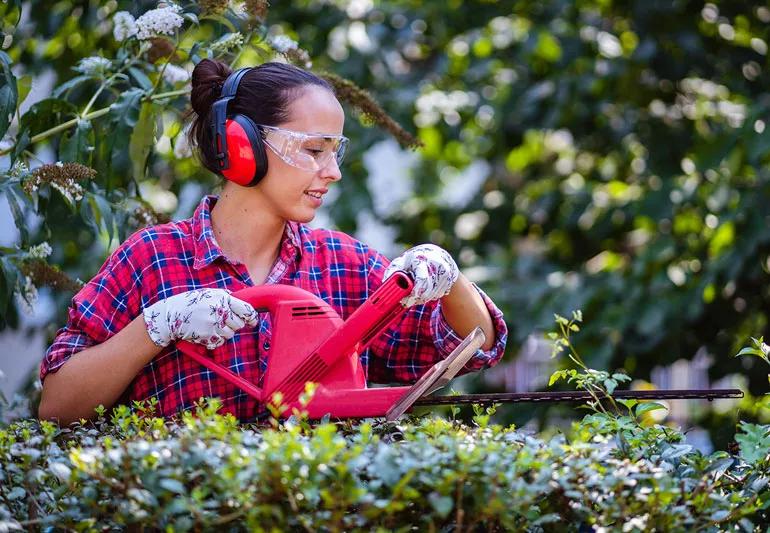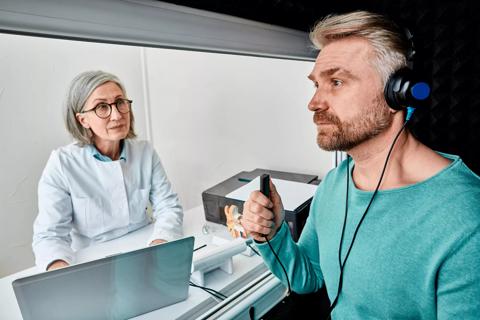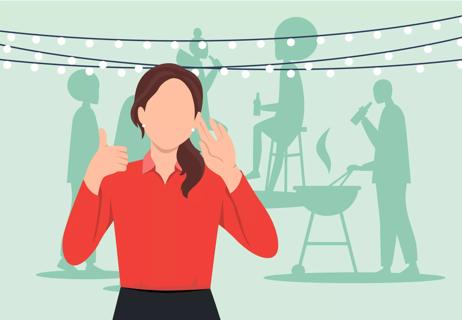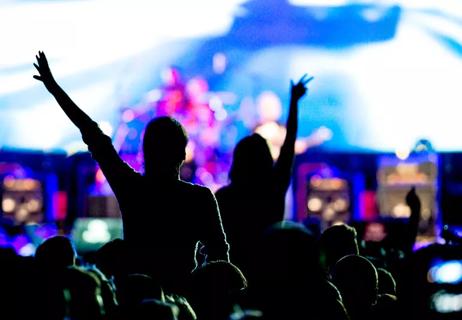Plus, 3 ways to prevent noise-induced hearing loss

Here’s a cheery thought as you sip your coffee: If you’re in your 30s, you could already have hearing damage — and you may not even know it. As audiologist Sharon Sandridge, PhD, explains, “Hearing is not like seeing. You know when your eyes are going. But it’s much harder to detect early hearing loss.”
Advertisement
Cleveland Clinic is a non-profit academic medical center. Advertising on our site helps support our mission. We do not endorse non-Cleveland Clinic products or services. Policy
But wait! If you know the signs to look for and take some preventive steps, you can stop hearing damage from happening (or getting worse). Dr. Sandridge walks us through it:
Hearing loss affects more than 36 million adults, and we’re not just talking about Nana. Nearly 20% of people in their 20s have some degree of hearing damage.
Generally, high-frequency hearing loss comes first, which means background noise and people talking sound muffled. Then the volume starts its gradual move towards mute. So what’s a young or middle-aged adult to do? Dr. Sandridge says the key is prevention and recognizing the early signs of noise-induced hearing loss.
Dr. Sandridge says the most common cause of hearing loss at 30 and 40 is excessive sound. “Any loud sound can cause noise-induced hearing loss, including music and the crowd at a sporting event.”
Here’s why: New research has shown that loud sounds break the microorganisms in your ear that help you hear. “Those microorganisms are responsible for dropping off neurotransmitters that allow our ears to function swiftly and properly,” explains Dr. Sandridge. “If they aren’t working, the ear doesn’t function the way it’s supposed to.”
The amount of damage depends on how loud a sound is and your length of exposure. “The louder the sound, the shorter that exposure time can be,” notes Dr. Sandridge.
Advertisement
Noise measured at or above:
After 10 minutes at 100 dB, your hearing is now on the clock. “You only have five minutes left at that level for the rest of the day before you’re maxed out.”
Since damage to your ears often happens gradually, you might not notice it at first. According to the U.S. Centers for Disease Control and Prevention (CDC), nearly one in four people between the ages of 20 and 69 have measurable hearing damage — but think their hearing is excellent.
Two signs that should turn up the volume on your suspicions:
If you notice either of these signs, see an audiologist as soon as possible. “It’s hard to detect a hearing problem on your own early enough to prevent hearing loss,” Dr. Sandridge says.
“Mild hearing loss will show up on a hearing test, but YOU won’t notice it until after five years of excessive noise exposure. And if you keep fatiguing your ears, the hearing damage only gets worse.”
The good news is noise-induced hearing loss is 100% preventable, especially if you follow these three tips:
Brace yourself. Dr. Sandridge recommends getting a hearing test as early as your 20s, even if your ears seem to be firing on all cylinders.
“After college is a good time to get a hearing baseline. Then, have your hearing tested every five years to see if there are any changes,” advises Dr. Sandridge.
Advertisement
She explains: “A hearing test gives us a line graph of your hearing sensitivity. Certain patterns tell us if the loss is due to excessive noise. If we see little dips, we’ll be more aggressive with our counseling to stop further damage or maintain the hearing you have.”
While Dr. Sandridge says the stigma still exists for wearing hearing aids (for young and old alike) they’ve come a long way in the last 15 years.
“They are so cosmetically appealing now,” relates Dr. Sandridge. “They are little and sit behind your ear. You can no longer see the wire going into your ear. They are also great quality and natural sounding devices.”
Finding the perfect hearing aid for you mostly comes down to your motivation. “There is an effort to wearing them. You have to clean them, put them in every day, and change their batteries or charge them. You have to want to do all that,” says Dr. Sandridge. “But if you do, it will be worth it.”
Advertisement
Learn more about our editorial process.
Advertisement

Sudden hearing loss can have many causes — but it’s important to seek treatment fast

Hearing aids can be enough for some people, but other devices — like for your phone, TV and fire alarm — can help, too

Untreated hearing loss can affect kids’ speech and language development and their overall quality of life

Avoid poorly fitting gear, opt for quality devices and consider sound-limiting technology to help prevent noise-induced hearing loss

Reduce background noise, don’t talk too fast or too slow and above all, ask what’s most helpful to them

COVID-19 may be associated with tinnitus, but research is still ongoing

There are lots of tips, tricks and assistive devices out there that can help

Ringing is already a sign of damage, but you can take steps to keep your hearing protected

If you’re feeling short of breath, sleep can be tough — propping yourself up or sleeping on your side may help

If you fear the unknown or find yourself needing reassurance often, you may identify with this attachment style

If you’re looking to boost your gut health, it’s better to get fiber from whole foods